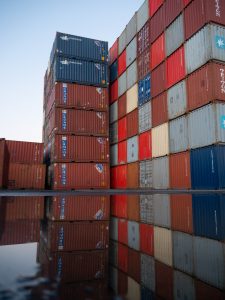China’s Stringent Zero Covid Policy Strikes a Barely Recovered Supply Chain
The supply chain continues to limp along on its Sisyphean struggle back to normal. An outbreak of Covid-19 cases tied to the Omicron variant have caused China to take drastic measures and issue a near total shutdown of Shanghai, one of the world’s most populous cities.
The Shanghai lockdown is notable for several reasons, not the least of which it is the largest lockdown in China since Wuhan, widely believed to be the origin of the Covid-19 pandemic. As of Sunday, March 27th, there were roughly 6,000 cases reported in all of China, with about half of the confirmed cases in Shanghai. This number may seem infinitesimally low compared to other countries, but China has adopted a “Zero Covid” policy for the majority of the pandemic and an outbreak, even of this size, is a major cause for concern for the government.

Photo courtesy of Pat Whelen.
Effects on Freight Forwarding
Numerous financial services headquartered in the city and the Shanghai Stock Exchange have shifted as many services as possible online. Local restaurants (such as international chains: McDonald’s, Pizza Hut and KFC) have shuttered their doors. Factories and shopping malls are closing for the time being, as well, with any workers who can work remotely being encouraged to do so. Unfortunately, Shanghai’s port, the largest port in the world, does not have that option. Even still, the plan is to maintain operations under the “essential services” label.
While the Shanghai port will still be open, freight forwarders are being encouraged to use alternate ports due to trucking issues and other restrictions in the city. The Shanghai airport is still operating at a normal level, but that could change if more cases are found and the lockdown is extended past April 5th. It is advisable at this moment to prepare for worst case scenarios.
The capital city of Beijing is experiencing trucking delays due to its own set of restrictions; elsewhere, the Hong Kong border provides a different set of issues. The Ningbo terminal, which has previously experienced pandemic-related disruptions in service, is a recommended alternative until the lockdown in Shanghai is lifted.
Details of the Shanghai Lockdown
China is taking extraordinary steps with the Shanghai lockdown. The current plan is to shutdown the city in two halves; east of the Huangpu River will completely shut down except for essential services for four days, then the side west of the river will do the same. The east side of the city is mostly the business district and the west is more residential. Certain financial institutions called employees to their offices before the lockdown went into effect so they could sleep at the office for the duration of the lockdown. The hope is this split lockdown will isolate any cases of Covid-19 without completely disrupting the local, national and international economy.
 During this time, Shanghai is taking on the extensive task of testing every single person who calls Shanghai home—for those of you doing quick math, that’s over 3 million tests per day for the 25 million people who call the city home.
During this time, Shanghai is taking on the extensive task of testing every single person who calls Shanghai home—for those of you doing quick math, that’s over 3 million tests per day for the 25 million people who call the city home.
Continued Impacts on the Automotive Industry
The automotive industry continues to be one of the hardest hit by the coronavirus pandemic. Tesla has announced a pause in production in their Shanghai plant until at least Thursday, March 31st. Incidentally, CEO Elon Musk announced he had tested positive for Covid-19. All of this comes at a time when Tesla stock prices are, against all odds, skyrocketing amongst rumors of a potential stock split.
Despite delays in the supply chain and rises in gas prices, forecasters remain bullish. However, these new lockdowns in China and the war in Ukraine are squeezing the supply chain about as thin as it can possibly go. US auto sales are slumping, with finger pointing at chip shortages, inventory size and other possible culprits. The reality is less affluent buyers are being kept out of the automotive market. Car sales are expected to fall 24% in March and 16% in the first quarter. Until the lockdowns are lifted and bottlenecks clear, inventories will continue to shrink and prices will continue to rise.
How SiShips Gives You The Advantage
Sheltered International combines expertise with state of the art software to bring you the highest quality domestic and international shipping solutions. With the world constantly changing, SiShips puts the shipper in control, offering efficient and cost effective ways to ship your product.
To learn more about managed transportation with SiShips, or to view a demo of our software, contact us today.

